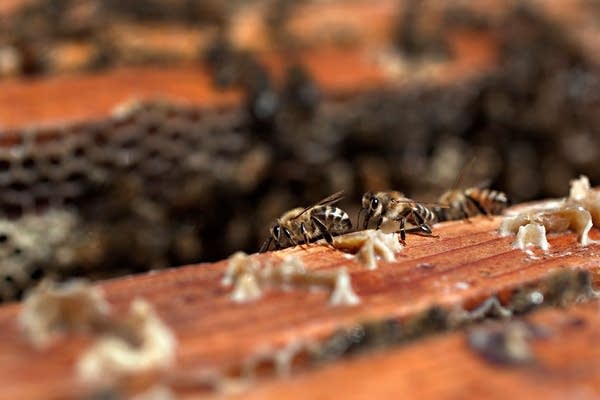What are insecticides doing to Minnesota bees?

Go Deeper.
Create an account or log in to save stories.
Like this?
Thanks for liking this story! We have added it to a list of your favorite stories.
Farmers across Minnesota are busy putting seeds in the ground, hoping for a good harvest.
Many of those seeds are treated with chemicals, like fungicides and pesticides, to protect the plants as they grow. But the use of insecticides on seeds has sparked controversy following scientific studies that show the chemicals, specifically neonicotinoid insecticide, can harm bees.
In March, the Minnesota Legislature rejected a proposal to allow the state agriculture department to regulate treated seeds
But just last week, a federal judge in California ruled that the Environmental Protection Agency violated the federal Endangered Species Act when it approved dozens of neonicotinoid insecticide products.
Turn Up Your Support
MPR News helps you turn down the noise and build shared understanding. Turn up your support for this public resource and keep trusted journalism accessible to all.
MPR News host Tom Weber was joined by MPR News reporter Dan Gunderson, entomologist Judy Wu-Smart, and Tom Slunecka, the head of the Minnesota Soybean Growers Association, to discuss these legal developments and how insecticides effect bees.
"Farmers look at their fields, they look at the history of pests on that field, and they'll go to their seed dealer and say 'OK,I want these two products,' or 'I want these three products,' and they make a conscious decision of what they want on those seeds," said Slunecka, adding that the chemicals are tested before they are added to the seeds, and the results of those tests are communicated to farmers.
But the problems aren't just on the farmers' fields, said Wu-Smart, explaining that chemicals can leave the seeds as contaminated dust that then spreads to nearby vegetation.
"We do know that there are several studies that show that the chemicals are showing up in the nectar and the pollen of plants outside of the field," she said.
But to just stop using the neonicotinoid component isn't an option. There aren't many approved products that can combat pests as effectively, Slunecka said.
"Without having this tool in our toolbox it would cost millions of dollars in lost soybean production and ultimately impact consumers globally," he said.
Bee colonies are small coming out of winter into springtime, a season in which many farmers are starting to plant. So, regulations keeping these coated seeds from entering the soil until later in the season could result in positive outcomes for bee populations, Wu-Smart said.
These pesticides aren't the only problem, however. Changes in farming techniques have resulted in fewer flowering plants around Minnesota, and an uptick in diseases and parasites found in managed honey bee colonies are also hurting pollinator populations, Gunderson said.
To hear the full discussion, use the audio player above.



